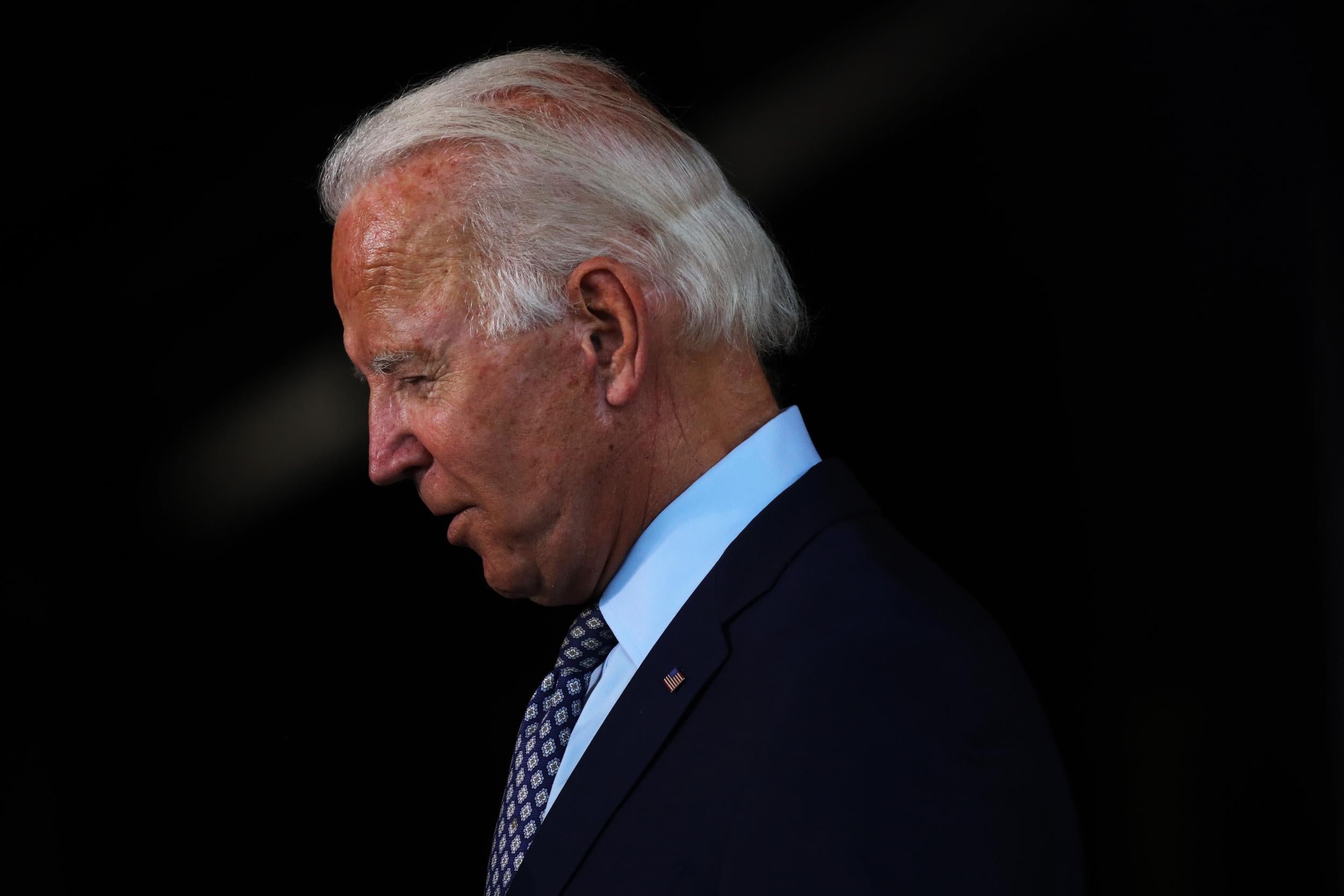It is too late for Joe Biden or any other president to restore America’s leadership in the Middle East

The Independent employs reporters around the world to bring you truly independent journalism. To support us, please consider a contribution.
Over the last 30 years, there are two military incidents in particular that define the US approach to the Middle East. Iraq’s invasion of Kuwait in 1990 marked the beginning of the US military existence in the Gulf and a more assertive policy towards the region. And last September, the US’s inaction to defend Saudi Arabia from the attack against the Abqaiq and Khurais oil facilities marks the nation’s retreat.
In 1990, President George H W Bush was keen to uphold America’s new role as the enforcer of international norms, as well as maintain the power balance, oil, and Israel’s security. Yet in the past three years, Trump has seemed ready to turn his back on these crucial security and strategic objectives.
A President Joe Biden won’t try to send 100,000 troops to the region as Bush once did. These days are over. Neither will he adopt Donald Trump’s apathy.
Download the new Independent Premium app Sharing the full story, not just the headlines
As I wrote a couple of weeks ago, Biden would offer much-needed new style of leadership.
But offering to be a leader is not enough – his authority cannot spring from the president’s will alone. Leadership emerges from an altercation of interests, collective thinking of policymakers, experts and state institutions and sufficient resources to project it abroad. Biden is likely to face fierce resistance – he may find the American political elite no longer agree with his plan for the Middle East.
First, Trump is not the reason behind the US’s shift to isolationism. He is a by-product of a growing trend. Ironically, the US retreat started during Obama’s administration, where Biden served as vice president. Obama, for example, chose to take the back seat in Libya and Syria, and couldn’t stop the war in Yemen from breaking out. And in 2013 the Obama-Biden administration ignored the “red line” Assad had passed when his forces used chemical weapons against innocent civilians, killing more than 1,300 people after Russia had promised to dismantle Assad’s arsenal of chemical weapons.
After George W Bush, in fact, the US has looked the other way on atrocities against civilians in Syria, Iraq, Yemen and Libya as long as they are being carried out by conventional, not nuclear, weapons.
This is primarily because of the absence of strategy, the lack of resources and political will to intervene further. The majority of Americans also would like their government to reduce intervention in conflicts abroad, rather than taking matters in its own hands.
And after three years of Trump’s presidency, most of the US troops that were already in the Middle East before his administration are still there. But now, their existence lacks purpose. The US may know what it doesn’t want. That is the resurrection of Isis, a sweeping attack on Israel, China’s control over the oil flow and a nuclear Iran. But the US no longer knows what it really wants in the region.
Now, for the first time since the Second World War, the US seems ready to share its hegemonic position with other powers. The US retreat made the Middle East a free-for-all region. Russia carried out daring military operations on Nato’s doorsteps in Syria and Libya. China is coercing many countries with its debt-trap diplomacy. Iran, Turkey and Saudi Arabia are living their military interventionism heyday, and Egypt is threatening to carry out a massive scale military assault in Libya.
Oil is no longer central to US security, nor it is still the strategic commodity it once was, although protecting its flows and preventing China from weaponising it is still vital for the US and its allies’ interests. Furthermore, the Israeli-Palestinian conflict is no longer the lynchpin to peace in the Middle East and Israel has more Arab-Sunni allies now than ever in its short history, and they share a common objective: To contain or break Iran. The majority of the Arab states no longer pose any threat to Israel.
American diplomatic mediations in conflicts around the region are now insufficient and substance-free, since they have been reduced to cheerleading other countries actions without having a clear plan. This convinced the regional powers that linking their countries’ security to that of the US is a prescription for chaos, and they should take care of their own national interests.
And guess what? The result was, of course, more chaos.
On his campaign website, Biden has pledged to keep a small number of troops to patrol the Gulf and make sure Isis won’t spring up again. This means maintaining Trump’s status quo.
Shape Created with Sketch. Palestinian protests against President Trump’s Middle East peace plan Show all 18 left Created with Sketch. right Created with Sketch. Shape Created with Sketch. Palestinian protests against President Trump’s Middle East peace plan 1/18 AFP via Getty 2/18 Palestinian protesters burn pictures of US President Donald Trump and Israel’s Prime Minister Benjamin Netanyahu during a demonstration in the West Bank against the expected peace plan proposal AFP via Getty 3/18 US President and Israeli Prime Minister Benjamin Netanyahu announce Trump’s Middle East peace plan in the White House AFP via Getty 4/18 Reuters 5/18 AFP via Getty 6/18 AFP via Getty 7/18 Reuters 8/18 EPA 9/18 EPA 10/18 AFP via Getty 11/18 AFP via Getty 12/18 EPA 13/18 EPA 14/18 EPA 15/18 AFP via Getty 16/18 AFP via Getty 17/18 AFP via Getty 18/18 AP 1/18 AFP via Getty 2/18 Palestinian protesters burn pictures of US President Donald Trump and Israel’s Prime Minister Benjamin Netanyahu during a demonstration in the West Bank against the expected peace plan proposal AFP via Getty 3/18 US President and Israeli Prime Minister Benjamin Netanyahu announce Trump’s Middle East peace plan in the White House AFP via Getty 4/18 Reuters 5/18 AFP via Getty 6/18 AFP via Getty 7/18 Reuters 8/18 EPA 9/18 EPA 10/18 AFP via Getty 11/18 AFP via Getty 12/18 EPA 13/18 EPA 14/18 EPA 15/18 AFP via Getty 16/18 AFP via Getty 17/18 AFP via Getty 18/18 AP
If Biden wants to put the US back in the driving seat when it comes to diplomacy in the Middle East, his aides will have to answer these questions: What will be the future of the Israeli-Palestinian conflict? What is his plan for the Gulf’s security? How will the administration end wars in Syria, Yemen and Libya? How will he convince (or coerce) both the US’s unchecked allies and foes to get in line? And can Europe handle the migration flows by itself?
Wars in Iraq and Libya taught Americans that they couldn’t rebuild states and create democracies. And Trump’s administration showed the people of the Middle East that America can’t stop wars, can’t hold rogue leaders accountable and can’t protect its allies, most recently the Saudi’s oil facilities.
This was parallel to the aggressive rise of China and before three crises have hit the US: the coronavirus pandemic, an ensuing economic crisis, and a racial justice crisis as demonstrated by the Black Lives Matter demonstration worldwide. America’s image has been dealt a blow. Global trust in its resolve is fading, and domestic police, health and economic reforms have become the pressing priorities for all Americans.
After all this, if Biden wants to show leadership in the Middle East, he has to be prepared to answer these barbed questions, or back up and go home.






